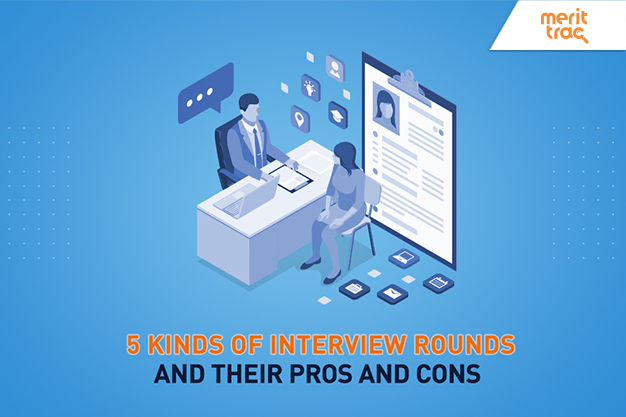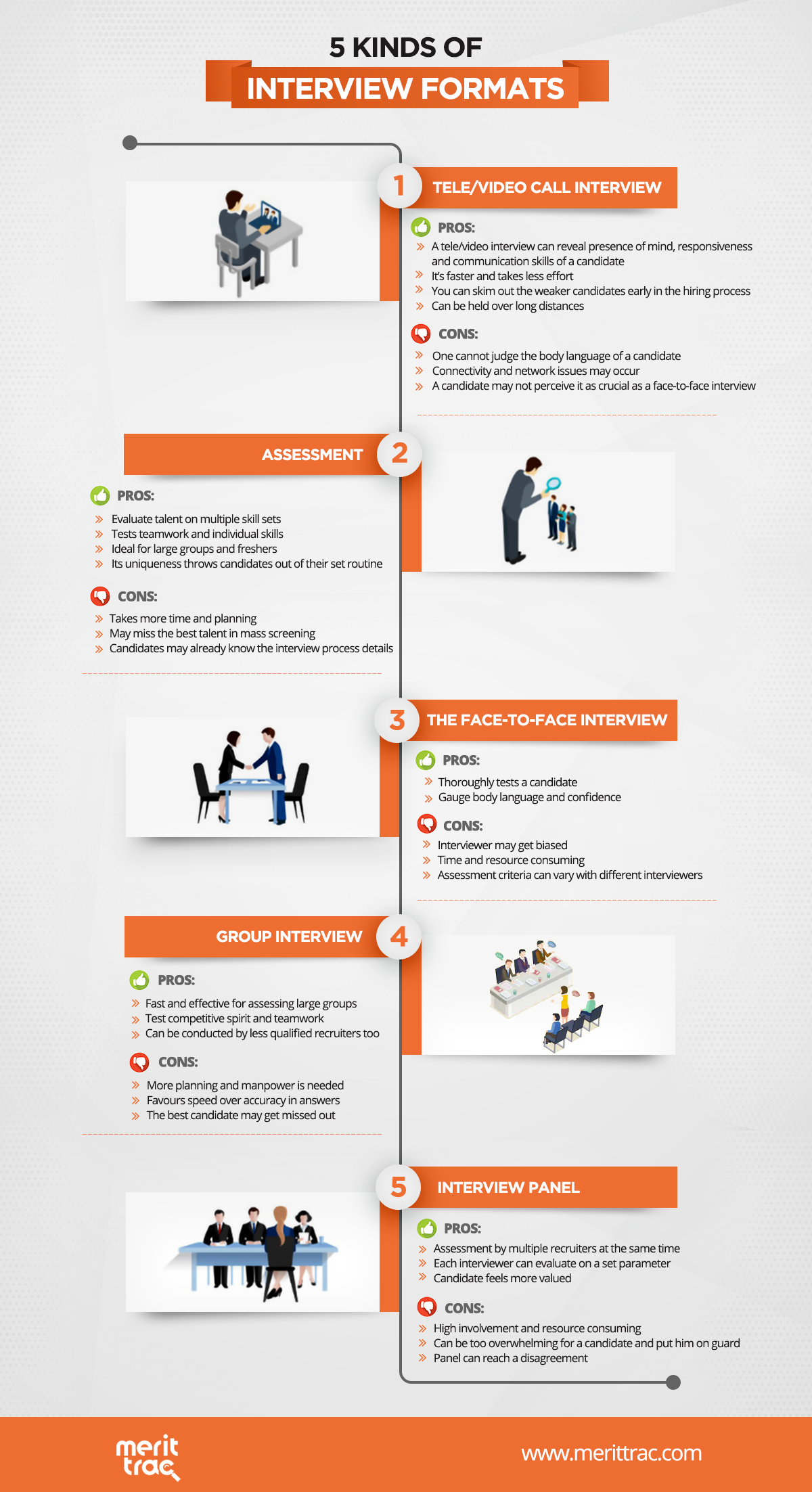
5 Kinds of Interview Rounds and Their Pros and Cons
Date: 30/01/2019 | Posted by: MeritTrac | Category: Corporate , Interview
In the corporate world, an interview is considered as the final test for accessing a candidate’s competencies, abilities and aptness for the role.
It may be true that over time, a recruiter tends to develop his own way or method of conducting an interview, the bottom line is that he must extract the right professional, psychological and functional insights from a candidate to make the best hiring decisions for his company.
We all want to know how to separate cream from milk when it comes to hiring and, in this article, we are going to help you achieve that.
Ready to prepare your dream team?
5 Tips to Crack the Job Interviews
You only have one chance to leave a first impression when you meet someone for the first time. When you are interviewing for a new job, preparing for the interview will help determine your probability of success. There are a few crucial factors to take into account in order to properly complete the interview:
5 Kinds of Interview Formats
Depending on the industry, geography and the role itself, an interviewer makes fine tuning into his hiring process, but it can be broadly divided into five categories. Each one has its own pros and cons and one can employ a blend of these to achieve desired goals.

Let’s look at these closely.
1. Tele/Video Call Interview
It must be noted that interview is a resource and time consuming process and one must employ methods that weed out misfits and weaker candidates effectively.
Interviews held over a telephone or a video call help in a quick candidate assessment when you have a long list of candidates. What the CV may not reveal can be probed through a telephonic interview and the recruiter can draw conclusions based on the conversation, tone and responsiveness of the candidate.
Pros:
- A tele/video interview can reveal presence of mind, responsiveness and communication skills of a candidate
- It’s faster and takes less effort
- You can skim out the weaker candidates early in the hiring process
- Can be held over long distances
Cons:
- One cannot judge the body language of a candidate
- Connectivity and network issues may occur
- A candidate may not perceive it as crucial as a face-to-face interview
2. Assessment
Assessment rounds have become a standard for mass hiring. Hiring experts believe assessment rounds are best suited for fresh graduates and help in assessing multiple skill sets and evaluating talent on individual and group skills.
A typical assessment can last a full day and may include presenting a case study, group tasks, personal interview, psychometric and physical tests.
Many companies employ innovative strategies like games and experiential case study based assessment platforms like Authess to measure competency of candidates in diverse role based situations.
Pros:
- Evaluate talent on multiple skill sets
- Tests teamwork and individual skills
- Ideal for large groups and freshers
- Its uniqueness throws candidates out of their set routine
Cons:
- Takes more time and planning
- May miss the best talent in mass screening
- Candidates may already know the interview process details
3. The Face-to-Face Interview
Considered a gold standard for evaluating a candidate, face to face type of interview can range from soul probing conversations to a stress interview making the candidate sweat all over.
A face to face interview allows the recruiter to gauge a candidate on many parameters be it body language, interpersonal skills and spontaneity. It also helps in testing a candidate’s domain knowledge by quizzing his theoretical knowledge.
Pros:
- Thoroughly tests a candidate
- Gauge body language and confidence
Cons:
- Interviewer may get biased
- Time and resource consuming
- Assessment criteria can vary with different interviewers
4. Interview Panel
An interview panel is considered a more accurate method of conducting a personal interview. It takes away the risk of personal bias and offers a well-rounded assessment where every member of the panel adds a valuable insight about the candidate.
Pros:
- Assessment by multiple recruiters at the same time
- Each interviewer can evaluate on a set parameter
- Candidate feels more valued
Cons:
- High involvement and resource consuming
- Can be too overwhelming for a candidate and put him on guard
- Panel can reach a disagreement
5. Group Interview
A less popular interview process these days, group interview tests more than one candidate at a go. The interviewer asks the same question, or the next sequential question to a group of candidates and may use elimination, scoring or rapid fire rounds to assess every candidate.
This interview process tests the competitiveness of candidates and allows the hirers assess a large number of candidates.
Pros:
- Fast and effective for assessing large groups
- Test competitive spirit and teamwork
- Can be conducted by less qualified recruiters too
Cons:
- More planning and manpower is needed
- Favours speed over accuracy in answers
- The best candidate may get missed out
Types of Interview Rounds
Interview round can be of different types such as:
- 5 Rounds of Interview
- 4 Rounds of Interview
- 3 Rounds of Interview
5 Rounds of Interview
Usually conducted for fresh graduates, the 5 round interview encompasses assessments and tests to determine aptitude, cognitive ability, and behavioral traits.
The main advantage of this 5 step interview method is a detailed analysis of a wide range of employability parameters.
The disadvantage of a 5 round interview conducted the traditional way is that the amount of time, money, and effort invested is higher.
4 Rounds of Interview
A four-round interview will consist of pre-screening tests, aptitude or domain skill test, HR interview, and a hiring manager interview.
Compared to a 5-round interview, this process has lesser number of aptitude/cognitive/behavioural tests and it tends to focus on domain-specific tests.
The advantage of this interview process is a quick result processing time. A four round-interview that fails to include behavioral assessment can cause higher attrition rates.
3 Rounds of Interview
A 3 round interview is commonly conducted for experienced professionals who are specially selected for their skills and abilities. This type of interview may include an HR round, technical round and a final discussion round.
A 3 round interview is excellent when you have to make quick hiring decisions, but if your recruitment strategy does not include online assessment tools, then it could lead to mis-hires.
Interview Rounds in Software Companies
The number or types of interview rounds may differ from one organization to another based on the job role. Here is a list of possible interview rounds followed by top Indian software companies.
- Telligent Interview Rounds: A total of 3 to 4 rounds of interviews are conducted for various software jobs at Telligent. This may include an HR round, basic aptitude round, a technical round, and a face-to-face interview round with a hiring manager.
- Interview Rounds in TCS: Four rounds of interviews are conducted by TCS, and this includes aptitude test, technical interview, a managerial interview, and an HR interview.
- Infosys Interview Process: A software job interview at Infosys may contain only two rounds featuring a technical interview round and an HR round. Job interviews for entry-level candidates may include a reasoning ability round, quantitative aptitude round, and a verbal ability round.
From conventional to futuristic hiring
Interviewing may not be an exact science and many would agree that there is no right or wrong way to conduct an interview, but now-a-days we are using technology to turn into a near exact science. Simulations are changing the conventional hiring process to deliver better results in role-based situations.
Like MeritTrac's CodeTrac, a performance-based coding platform that provides real-time feedback to help companies assess candidates’ coding skills for performance benchmarking and effective recruitment.
The platform is integrated with domain-based tests to assess candidates’ end-to-end full-stack software development capability and benchmark it with industry standards.
By leveraging CodeTrac, organizations can design an efficient developer recruitment cycle, bridge skill gaps for employee career progression, build customized coding scenarios based on business needs, and tailor pre- as well as post-training requirements

Transform your organization’s hiring strategy with futuristic assessment platforms.
MeritTrac’s rich suite of technology-led assessments is designed to support the unique hiring needs
of organizations.













 Sales Hotline: USA: +1 646 916 0939 / Others: +91 80619 14700
Sales Hotline: USA: +1 646 916 0939 / Others: +91 80619 14700


